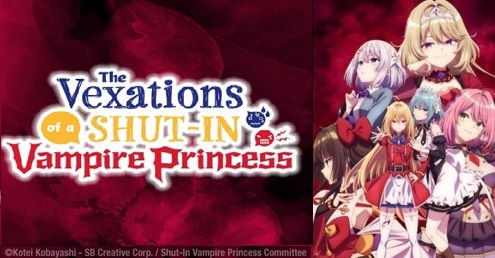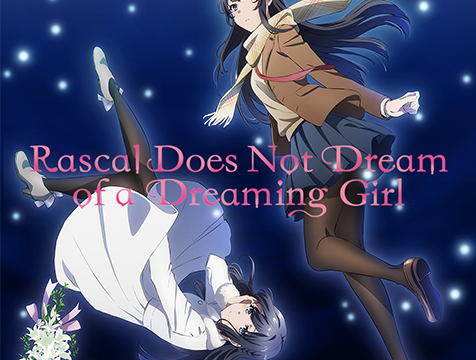English Dub Season Review: The Vexations of a Shut-In Vampire Princess Season One
Based on the Japanese light novel series written by Kotei Kobayashi and illustrated by Riichu. The story takes place in a world where death is not permanent, Terakomari “Komari” Gandesblood has been a self-proclaimed professional shut-in for the past three years. As part of the noble Gandesblood lineage, she once tried to meet the expectations of her family. However, as a vampire who cannot use magic or consume blood, she soon gave up on becoming an imperial general like her ancestors. Unfortunately, a misunderstanding with her father earns her the formidable position of one of the Seven Crimson Lords, the strongest fighters and generals in the Mulnite Empire.
Now, Komari must hide her lack of talent from the soldiers she commands, or they may attempt to overthrow her. Working alongside her newly assigned maid, Villhaze, Komari manages to trick her unit of soldiers into believing she is a ruthless warlord and promises to conquer the world. But as more people come to admire Komari, her life is further threatened as a vampire from her past reappears intending to kill her for good…
On the technical side, this anime adaptation was produced by Project No.9 and directed by Tatsuma Minamikawa, with scripts supervised by Keiichirō Ōchi, characters designed by Tomoyuki Shitaya, and music composed by Go Shiina. The opening theme is “Red Liberation” by fripSide, while the ending theme is “Nemurenai” by Miminari feat. Tomori Kusunoki.
In a nutshell, the story revolves around Terakomari “Komari” Gandesblood, a 15-year-old vampire princess from the aristocratic Gandesblood family. Despite her noble lineage, Komari faces two significant challenges: 1. she cannot consume blood or use magic, and 2. Social Interaction which leads her to live as a recluse. Her father, one of the Mulnite Empire’s most formidable generals, is known as one of the Seven Crimson Lords. When he passes his title to Komari, she reluctantly becomes a general in the Mulnite Imperial Army. Komari is thrust into leading the 7th Unit having to lead a motley crew of 250 monster soldiers including ruffians, criminals, and unstable individuals. With the help of her devoted maid Villhaze, Komari must navigate her new role and the dangers that come with it, all while avoiding rebellion and maintaining her facade sort of like how in the story “Puss n Boots” the lies slowly become reality.
A good portion of the narrative follows Komari’s reluctant rise to prominence. Despite the grand titles and expectations, Komari is seen by others as a deceptive leader, unfit for the role of a ruthless warlord. Her true past and the heritage of the Gandesblood family remain hidden from most. Komari’s closest ally is her maid Villhaze, whose devotion and antics add a comedic and sometimes uncomfortable element to the story since she’s romantically attracted to her, yet Komari is understandably irked by her behavior and won’t reciprocate due to her eccentric and sometimes perverse proclivities towards her.
The series attempts to delve into the complex relationships and power struggles within the kingdom, introducing characters like Komari’s greatest foe Millicent Bluenight, and Sakuna Memoir, who played roles in Komari’s upbringing. While the show explores themes like the “power of friendship,” it also highlights Komari’s hidden strengths and potential to become a powerful figure, despite Komari’s initial incompetence and the proverbial “game face” she’s forced to put on since she’s told that if she even tries to give up on her position (which is allegedly tied to some sort of magic spell), she’ll magically explode and die. On a personal level, I call bullshit on this rule, but more on that later…
Granted, the premise itself has potential for its situational “comedy of errors” type of humor, but the show fails to deliver on that front, or the fact that it also falls victim to relying on tired tropes and sexualized scenes with strong lgbtq undertones that only feel uncomfortable because Komari is a clueless 15-year-old girl in a “reverse harem” scenario surrounded by other girls who are possibly older than her which can feel a bit creepy. Especially Villhaze’s weird-ass flirtatious moments, or the fact that Komari’s Aunt Karen likes to casually grope her in public which raises all sorts of uncomfortable questions about her family. And doesn’t help that they entrusted a clueless 15-year-old into a leadership role, and everyone instantly expects her to know what the fuck she’s doing despite her lack of leadership skills or her inability to curb some of the troublemaking troops within her army. Another of its biggest failures is the lack of consequences and risks. In several of its episodes, they try to set up a conflict only for one episode later to turn out to be completely pointless, all thanks to its inconsistent rules and rushed narrative. The fact that the characters cannot die at all and can be resurrected within the world in which the story takes place makes the battles feel more like games or “do-overs” than real conflicts, diminishing the tension and urgency and taking away from the plot since it makes us not care about anyone because we know for sure that they will be resurrected again at some point. This is because the resurrection process involves a magical object called a “dark core” and each kingdom within this universe has one and it’s not explained how far its power extends to its respective kingdoms or within their royal families. The third biggest flaw this show has is that the show slowly falls apart when it reveals a big secret about Komari in episode 4. And while that particular episode was cathartic in certain aspects, this revelation undermines the initial premise of Komari being a weak and reluctant leader and all amounts to whether or not Komari’s twist will come into play in later storylines, or the fact that certain vampires have a “Core Implosion” ability which is a unique superpower each one has that could turn the tides in battle but only works if they drink blood, yet most of them don’t even bother using it immediately in combat unless the plot demands them to.
The animation and music are noteworthy aspects of the series. The fight scenes are visually impressive, with fluid animation and vibrant colors that enhance the fantastical elements of the show. The musical score complements the action sequences well, adding intensity and excitement. Despite some inconsistencies in character design and occasional lapses in animation quality, these technical elements generally elevate the proceedings. However, the excessive fanservice and repetitive humor often detract from the show’s potential, leaving some emotional moments feeling underwhelming or out of place.
Overall, “Vexations of a Shut-In Vampire Princess” struggles to balance its comedic and dramatic tones, often veering into generic power fantasy territory that sometimes doesn’t know what it wants to be. While the animation and music deliver quality at certain places, they can’t fully compensate for the plot holes and inconsistent character development. Certain characters are introduced without proper development, and some plot points feel rushed or unfinished. For viewers seeking a lighthearted, visually appealing show with some action and humor, this series might work to a certain degree, but it’s unlikely to leave a lasting impression unless they can improve with a Season 2 in the future…


























"There are also other characters that come and go (also owned by the Warner Bros. Discovery conglomerate media company)."
Huh. Is that just referring to other characters from the show itself, or is this implying that the new season is going to have cameos from other WBD IPs